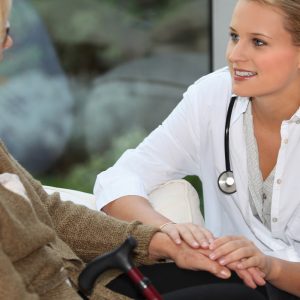by Roxanne Smedsrud, RN
When I was in junior high, my great-grandma Ree went to live in the nursing home in Devils Lake, N.D. She had dementia and could no longer care for herself. At the time, I knew that dementia meant she couldn’t remember things, and I thought it was just a normal part of “getting old.” She lived many years in the nursing home, and after awhile didn’t know her family or friends. She stopped talking, lost weight, became weaker and spent most of her time sleeping, either in bed or a wheel chair. The year she died she had pneumonia several times and was hospitalized a couple of times because of it.
It wasn’t until years later when I was a staff nurse at hospice and working with dementia patients that I realized dementia wasn’t a normal part of “getting old.” Dementia is a disease that causes impairments in language, memory, personality, behavior and judgment. It doesn’t only affect the memory, as I had thought for many years. It affects the whole mind and body. I have heard people say that dementia is the reverse order of development. If you think about it, this is true. We come into the world completely dependent on others for our needs, and for many advanced dementia patients, this is how they leave the world. Death is often caused by infection in the lungs, urinary tract or skin.
Dementia is the third leading cause of death among older American’s. Life expectancy is from 2-20 years after the onset of symptoms, with an average of 3-6 years, which is shorter than previously estimated. Approximately 70 percent of people with dementia die in the nursing home. Because of this, nursing homes are key providers of terminal care to dementia patients. Advanced dementia clearly meets accepted standards of an end-of-life condition, but it is not widely recognized as a terminal illness. Compared with other terminally ill patients, those with dementia receive less optimal pain control, have fewer advanced directives, undergo more burdensome interventions and receive less hospice care.
My grandma died 30 years ago, on June 14, 1981, the day after my wedding. I wore my mom’s wedding dress for our wedding, the dress my mom wore when she married my dad. The dress grandma Ree made for her 23 years earlier. Even though my grandma was not able to be at our wedding, I felt her with me. I know in her way she needed to be there, and after the wedding she was able to let go.
Hospice of the Red River Valley is nearing it’s 40th year of providing care to those at end of life. It makes me wonder how things may have been different for my grandma had hospice care been available at that time. Would she have needed to be hospitalized for the pneumonia? Would her family have chosen to continue to treat the infections? Would she have been more comfortable? If you have a family member, loved one, or friend with advanced dementia, please call us at (800) 237-4629 for more information. We can do an assessment free of charge to see if they qualify for hospice services.
Roxanne Smedsrud, RN, was a hospice nurse for 28 years with Hospice of the Red River Valley.
About Hospice of the Red River Valley
In 1981, Hospice of the Red River Valley was founded on the belief that everyone deserves access to high-quality end-of-life care. We fulfill our nonprofit mission by providing medical, emotional, personal and spiritual care, as well as grief support to our patients, their families and caregivers during a tender time in life. Our staff helps those we serve experience more meaningful moments through exceptional hospice care, 24 hours a day, 365 days a year, wherever a patient calls home. The organization serves more than 40,000 square miles in North Dakota and Minnesota, including in and around Bismarck, Detroit Lakes, Devils Lake, Fargo, Fergus Falls, Grand Forks, Lisbon, Thief River Falls, Valley City and many more communities. Hospice of the Red River Valley offers round-the-clock availability via phone, prompt response times and same-day admissions, including evenings, weekends and holidays. Contact us anytime at 800-237-4629 or hrrv.org.


